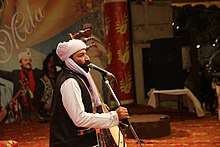Filmi pop
Filmi pop (Urdu: فلمی موسیقی filmi mosiqi) is a term first coined by Pakistani music journalist, Ali Tim in 1990 but made famous by the country's most influential pop critic, Nadeem F. Paracha. In 1966, a talented young playback singer Ahmed Rushdi (now considered as one of the greatest singers of south Asia) sang the first South Asian pop song ‘Ko Ko Korina’"[1] for the film Armaan. Composed by Sohail Rana, the song was a blend of 1960s bubblegum pop, rock and roll twist music and Pakistani film music. This genre would later be termed as filmi pop. Paired with Runa Laila, the singer is considered the pioneering father of pop music, mostly hip-hop and disco, in South Asia.[2]
| Music of Pakistan | |
|---|---|
 | |
| Genres | |
| Specific forms | |
| Religious music | |
| Ethnic music | |
| Other music | |
| Media and performance | |
| Music awards | Hum Awards Lux Style Awards Nigar Awards Pakistan Media Awards ARY Film Awards |
| Music charts | Patari Haftanama |
| Music festivals | All Pakistan Music Conference Lahore Music Meet Lok Virsa Mela |
| Music media | Magazines
Television
Internet |
| Nationalistic and patriotic songs | |
| National anthem | Qaumi Taranah |
| Regional music | |
| |
Following Rushdi's success, Christian bands specialising in jazz started performing at various night clubs and hotel lobbies[3] in Karachi, Hyderabad and Lahore. They would usually sing either famous American jazz hits or cover Rushdi's songs. Rushdi sang playback hits along with Laila until the Bangladesh Liberation War when East Pakistan was declared an independent state. Laila, being a Bengali, decided to leave for the new-found Bangladesh.[4]
See also
- Pakistani pop
- Pakistani hip hop
- Pakistani rock
References
- Logan, Stephen (2008). Asian communication handbook 2008. AMIC. p. 389. ISBN 978-981-4136-10-5.
- "Playback singer Ahmed rushdi remembered on his death anniversary". The News. Retrieved 11 April 2015.
- "Socio-political History of Modern Pop Music in Pakistan". Chowk. Archived from the original on 2010-06-18. Retrieved 2008-06-27.
- "Death Anniversary of Ahmed Rushdi". Duniya News. Archived from the original on 14 January 2016. Retrieved 29 November 2015.